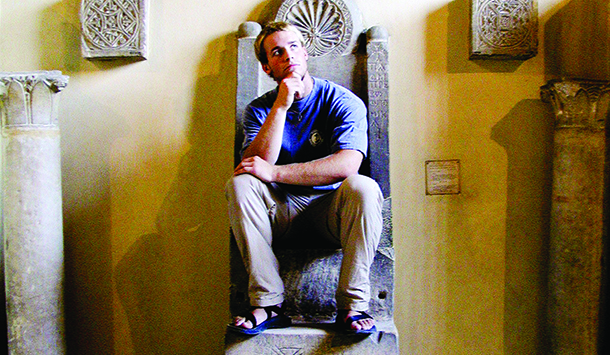David Landis ’04 grew up hearing stories about the Middle East. His dad, Steve Landis ’77, had gone on EMU’s very first cross-cultural to the region in 1975, and from the time David arrived on campus as a student himself, he knew he wanted to go too.
The wish came true in the fall of 2002, when Landis and 29 other students left for a semester of study and travel in the Middle East. It was the second time he’d ever been out of North America, the first being a post-high school choir trip to Europe.
That particular cross-cultural occurred during a tense time; the second Palestinian Intifada was continuing its violence, and the United States was preparing to go to war in Iraq. It was an intense, complicated experience, Landis said; the months of travel in a region of intense and clashing cultural, political and religious dynamics provided an educational opportunity unlike any he’d ever had.
“That became a lot more fascinating than some of the learning I was doing in school,” he told Crossroads. “We were not just students, [and] we were not just touring. We were travelers who were learning. It’s a totally different perspective than you see most people traveling with.”
During a week-long period of free travel that fall, Landis and three others from the trip hiked a section of the 600-mile-long Israel National Trail. The brief taste of life on the trail, in a place so full of confusing and enthralling and full of things to see and learn, only whet his appetite for more.
Aware of EMU’s record for producing graduates who succeed at medical school, Landis had intended to end up as a physician when he enrolled in EMU, but the semester-long experience abroad put a wrinkle in his schedule. It meant he was going to need an extra year between college and medical school to finish all his entrance requirements. But rather than taking his MCATs and working on med-school applications after graduation, he found himself planning a year-long, four-continent, round-the-world trip with Eric Kennel ’04, a close friend of Landis who’d been with him on the cross-cultural.
By the time they left, it had become clear to Landis that he wasn’t going to med school after all. He was more interested in the possibilities of travel as a unique way of learning and serving, much like he’d first experienced on his cross-cultural.
“After this trip, I really have no idea where I’ll be,” wrote Landis, on the website he and Kennel created to document their trip. “I’m hoping that this journey will provide insight into the many possibilities … and point me toward a certain direction for the future.”
While planning to hike the entire Israel National Trail during the year of travel, Landis befriended an Israeli hiking enthusiast named Maoz Inon, who later opened a hostel. The relationship turned out to be the future direction Landis was looking for. By 2007, the two began mapping and marking the Jesus Trail, a new 40-mile hiking route through the Galilee. The next year, Anna Dintaman ’05 Landis joined them (she and David married in 2010).
Today, the Landises have published a guidebook to the trail, which hosts thousands of visitors – including the EMU Middle East cross-cultural group – each year who come to retrace some of Jesus’ travels during his ministry.
“It’s amazing to see something [like this] that started with a learning experience at EMU,” said Landis. “Everything is kind of connected back to the cross-cultural, to that one week of hiking on free travel.”
With the Jesus Trail well-established, David and Anna – a member of the 2004 Middle East cross-cultural group – are focusing on other projects through their company, Village to Village press, which they founded to publish the tour guide they wrote for the Jesus Trail. In late 2012, they will release a guidebook to the Camino de Santiago, a route in northern Spain used by pilgrims to visit the traditional burial site of St. James. In the future, the two have several other ideas in the works, all of them promoting thoughtful, open-minded travel as a way of learning and change.
“It’s not just about how to get from point A to point B, it’s about having a meaningful, well-rounded experience along the way,” Landis said.
— Andrew Jenner
